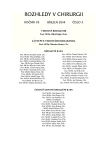-
Medical journals
- Career
Organisation and use of a tumour tissue bank
Authors: P. Fabian; R. Nenutil
Authors‘ workplace: Oddělení onkologické patologie, Masarykův onkologický ústav, Brno, primář: MUDr. P. Fabian
Published in: Rozhl. Chir., 2014, roč. 93, č. 3, s. 176-179.
Category: Various Specialization
Podpořeno MZ ČR – RVO (MOÚ, 00209805)
Podpořeno projektem MŠMT BBMRI_CZ LM2010004
Práce je určena k postgraduálnímu vzdělávání lékařů.Overview
Biobanking is a well-organized, sophisticated system that consists in programmed storage of biological material and corresponding data that is accessible for scientific investigation. In this article, we briefly describe the principles of a tumour biobank; namely sample collection, storage and distribution. The key role of pathologists in the process of biobank sample selection is highlighted; it is an integral part of gross specimen handling as a diagnostic procedure. The harmonization of standard operating procedures is an important issue; the biological material stored in a biobank must be processed in a manner that allows compatibility with other biobanks. Material withdrawal must be accompanied by a Material Transfer Agreement to cover all technical and ethical/legal issues concerning the scientific utilization of the released material.
Key words:
biobanks – standards – translational research
Sources
1. Council of Europe. Recommendation Rec 4 of the Committee of Ministers to Member States on Research on Biological Materials of Human Origin. Strasbourg, European Commission 2006. Dostupný z http://www.coe.int/T/DG3/Healthbioethic/Texts_and _documents/Rec_2006_4.pdf.
2. Artene SA, Ciurea ME, Purcaru SO, et al. Biobanking in a constantly developing medical world. ScientificWorldJournal 2013;23. Dostupný z http://dx.doi.org/10.1155/2013/343275.
3. Yuille M, van Ommen GJ, Bréchot C, Cambon-Thomsen A, et al. Biobanking for Europe. Brief Bioinform 2008;9 : 14–24.
4. Hatzis C, Sun H, Yao H, et al. Effects of tissue handling on RNA integrity and microarray measurements from resected breast cancers. J Natl Cancer Inst 2011;103 : 1871–83.
5. Bevilacqua G, Bosman F, Dassesse T, et al. The role of the pathologist in tissue banking: European Consensus Expert Group. Report. Virchows Arch 2010;456 : 449–54.
6. http://www.ukbiobank.ac.uk/wp-content/uploads/2012/09/Material-Transfer-Agreement.pdf.
7. Holub P, Greplová K, Knoflíčková D, et al. The biobanking research infrastructure BBMRI_CZ: a critical tool to enhance translational cancer research. Klin Onkol 2012;25, Suppl. 2 : 78–81.
Labels
Surgery Orthopaedics Trauma surgery
Article was published inPerspectives in Surgery

2014 Issue 3-
All articles in this issue
- Histopathological differential diagnosis of primary liver tumors
- Organisation and use of a tumour tissue bank
- Injury of the extensor mechanism in the zone I – mallet deformity
- Analysis of complications and clinical and pathologic factors in relation to the laparoscopic cholecystectomy
- Standardization of pancreatic cancer specimen pathological examination
- Transtibial amputation: sagittal flaps in patients with diabetic foot syndrome
- GIST of the small bowel in neurofibromatosis terrain as a source of massive bleeding
- Pathologic fluid collection of mesentery, differential diagnosis of mesenteric cysts – case report
- General principles of handling tissues and organs intended for examination in histopathology – pathologists’ requirements for surgeons
- Lymphatic metastasizing – viewed by pathologist
- Perspectives in Surgery
- Journal archive
- Current issue
- Online only
- About the journal
Most read in this issue- Lymphatic metastasizing – viewed by pathologist
- Pathologic fluid collection of mesentery, differential diagnosis of mesenteric cysts – case report
- Transtibial amputation: sagittal flaps in patients with diabetic foot syndrome
- Injury of the extensor mechanism in the zone I – mallet deformity
Login#ADS_BOTTOM_SCRIPTS#Forgotten passwordEnter the email address that you registered with. We will send you instructions on how to set a new password.
- Career

